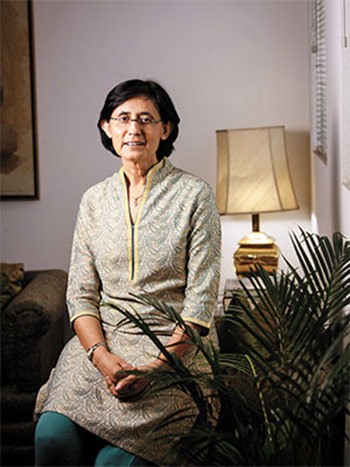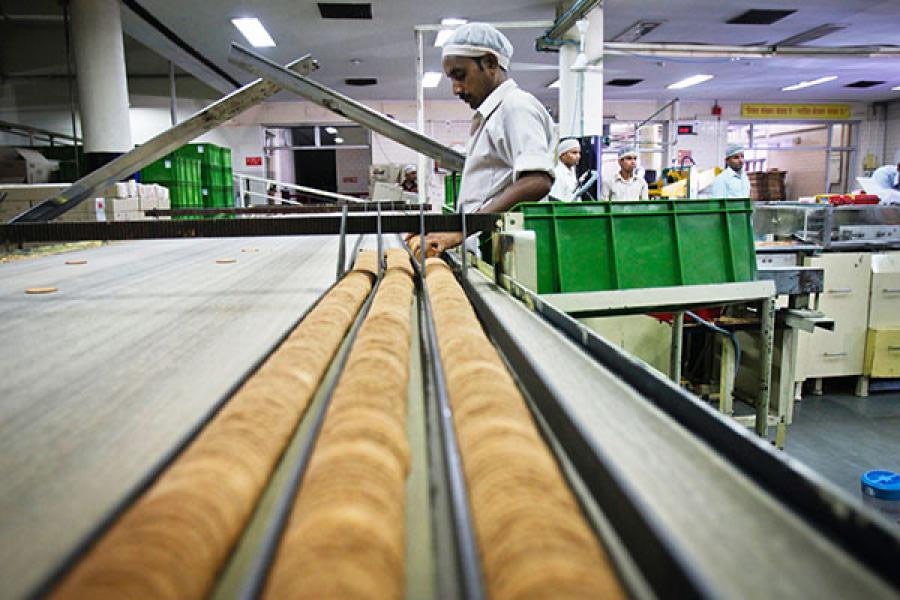Vinita Bali, who recently stepped down as the MD of Britannia Industries, now wants to focus on the creative lateral part of solving social problems

In a career spanning nearly four decades, Vinita Bali has held leadership roles with global brands like Cadbury and Coca-Cola. In her last assignment as the managing director of the Rs 6,829 crore Britannia Industries, she engineered the turnaround of the struggling company into a fast-growing brand: Britannia’s revenue quadrupled during her nine-year tenure. In an interview with Forbes India, Bali says she would now like to divide her time between the development sector, largely focusing on nutrition, and corporates through her advisory and board roles.
Q. After 37 years in the corporate sector, what are your plans now?
To lead a more eclectic life by moving from one full-time operational role to full time, multiple roles. The closest analogy is one of switching to a wide-angle lens from a zoom lens. It was driven by my desire for freedom and flexibility to do different things in the next few decades and make a more varied contribution, rather than be driven by operational responsibility. The 37 years I spent in the corporate world, living in six cities and five continents and travelling to at least another 65 countries (at last count), were fabulous and I now want to harness that experience and seriously spend part of my time in spaces that interest me in the development sector and classical arts. Simultaneously, I will continue my engagement with the corporate sector through boards and advisory roles that also provide a diverse mix across industries and sectors.
Q. What will be your focus in the development sector?
My focus is largely on nutrition. I have spent some time in understating the multiple dimensions of the challenge and figuring out how to be part of the solution. Nutrition has to do with access to food and proper drinking water, access to primary health care, hygiene, sanitation, and education. I have said several times that nutrition sits on the cusp of many other sectors, but is not the centre of any. Therefore, it doesn’t get the attention it deserves, even though in India it is a silent emergency that requires aligned action from the government, corporate, civil society and development agencies. Our reality, when it comes to nutrition, is one of the poorest in the world with one out of every three children born under-weight largely because of a malnourished mother. I am part of the lead group of the Scaling Up Nutrition (SUN) initiative of the United Nations, on the board of Global Alliance for Improved Nutrition (GAIN), a Geneva-based global NGO, and on the advisory board of Cornell University’s division of nutrition science. I also set up the Britannia Nutrition Foundation (BNF) in 2009 with the objective of raising awareness and saliency of the problem, sharing success stories from around the world and fostering public-private partnerships to address the malnutrition challenge. This portfolio helps me understand nutrition in its various dimensions. My involvement in these areas is the creative lateral part that I was missing during my full-time corporate roles.
Q. At present, what are your corporate engagements?
I’m on the global board of Syngenta, a Swiss agrochemical company based in Basel with global operations that focus on seeds and plant health. I have been fascinated by how much science there is to plants and seeds. It connects nicely with my interest in food, nutrition and health. I am also a member of their CSR committee. I’m on the board of Crisil Ltd, which I joined recently, and continue to be on the boards of Titan, the Wadia Group companies and Piramal Glass, which is a B2B business. I also joined the advisory board of The World Gold Council earlier this year. Being an experiential learner, it is great to be associated with these different businesses. When you are working for a company, whether you like it or not, you are put into a box. I want to spend my future in many boxes and not in any one box.

Q. You have said earlier that ‘the greater the challenge, the greater is the joy’. You joined Britannia when it was going through tough times. How did you transform the old biscuit company into a leading food brand?
There is no magic wand or elixir. You have to have a guiding idea that people can connect with; first strengthen the fundamentals, which you then build on. It is hard work and requires tenacity. You have to get the right people on board and give them the freedom to do their best work. In a way, I had prior turnaround experiences in Cadbury Nigeria and South Africa as sales and marketing director. My first business role was when I became president in Latin America for the Andean division of Coke. So when I came to Britannia, it was like zooming in on one company, one country and largely one sector in which it operated. I think my diversity of perspective and experience helped. Consumer-facing businesses that depend on a high velocity of transactions have to deeply understand consumers. You must understand how your brand fits into the life of a consumer, not the other way around.
Q. How did you look into innovation at Britannia?
Innovation is anything that adds new value, not just a new product or package. In fact, renovating and stretching existing brands is a great way to add value. Britannia had a brand called Nutrichoice, which we transformed from just a thin arrowroot biscuit to NutriChoice Digestive, which is a high-fibre biscuit, NutriChoice 5 Grain, which has multiple grains, and NutriChoice Diabetic Friendly, which has a low glycemic index. The more than quadrupling of revenue in the last nine years was mostly driven by organic growth. We didn’t launch many new brands during this period, but stretched existing ones with new product forms that were germane to the brand proposition. We made existing brands work really hard.
In nine years, the Britannia I inherited looked very different: We had a more diverse footprint of businesses, brands and geographies. We created a fairly large bakery business, expanded dairy and extended our footprint to the Middle East. Through that, we made Britannia products available in over 30 countries. We re-crafted the manufacturing footprint and added several greenfield units in two years in Bihar, Orissa and Gujarat and expanded existing units. We looked at cost right through the value chain and made it more competitive. We were the first bakery company to remove trans fat from our biscuit recipes and fortified over 50 percent of our bakery and dairy portfolio with micro-nutrients.
Q. What were your major challenges in Britannia?
The biggest challenge was how to take the latent equity of brand Britannia and other product-brands of the company and liberate them intelligently to realise their full potential, while at the same time create a back-end business model to sustain profitable growth in an industry challenged by inflation, volatility and thin margins. A related challenge was how to take significant cost out of the system, create the foundation for profitable growth and strengthen the supply chain. In the last few years, we focussed on cost efficiency and effectiveness. If you track the last six quarters of Britannia, you will see a very consistent improvement in margin.
Q. Are you satisfied with the Britannia you left?
Satisfied is a big word. I am never satisfied because I always feel I could have done more, with the benefit of hindsight. If I were to think about the transformation of Britannia, there is a lot that we did, especially in the area of a more diverse portfolio of businesses, geographic presence and credible talent in the system. As a business, it strengthened its foundation for significant growth in the future. Hopefully, we will now see the results; a lot of hard work of a lot of people has gone into it and continues to be reinforced as there are many opportunity areas still to be addressed.
Q. How would you describe the next phase of your life?
As I said earlier, the analogy is moving from a zoom lens to a wide angle lens. The view from a wide angle lens is obviously more expansive, inspirational and has the capability of making an impact in many more areas. I think a zoom lens is good as you advance in your operational roles. But it is largely confined to that particular business. When I was working with Cadbury, it was all about chocolate and other adjacent products and competitors. Similarly, when I was at Coca-Cola, it was like living in a world of beverages. With Britannia, it was largely bakery and a bit of dairy, so it was still like a zoom lens. In the next years of productive life, I would like to impact a wider variety of issues. At present, I’m dividing my time between the corporate world, which is a mix of boards and advisories not just in India, but global as well, doing high-level creative thinking on growth strategies with a few companies and spending time on development issues. I have got a two-year extension as a member of the UN lead group for SUN, which is not an initiative, but a movement, to develop and sustain multiple programmes for the 50 countries that have signed up to meet their millennium development goals. There are 27 of us who are part of the lead group.
Q. You had an extremely enriching career with the best global brands. How would you describe your corporate journey?
Somewhat unconventional, as corporate journeys go. My first job was with Voltas Ltd (a Tata group company) in Mumbai as a management trainee in 1977, where I worked on the launch of Rasna soft drink concentrate, which became a huge success instantaneously. I then joined Cadbury in India in 1980 and in 1983 went to the USA to pursue a PhD on a fully-funded scholarship. Within a year, I concluded that business had to be experienced, not studied, but before heading to Cadbury UK, I did an internship at the United Nations in New York.
With Cadbury, I worked in the UK, Nigeria and South Africa. When I went to Nigeria, it was an unconventional choice at that time in 1992. But, I learnt a lot about managing in a volatile environment. There were many challenges, which I thoroughly enjoyed. Subsequently, I chose to go to South Africa rather than return to India to head up the business. I don’t like status quo. I get bored in an environment where you are expected to do more of the same. I made career choices, which helped me reinvent myself every three to four years as I moved jobs, countries and continents. In my last role at Coke as vice president, global strategy, I was asked to create a think tank to identify long-term issues and opportunities and how to deal with them. All these experiences enhanced my understanding of different cultures and economies and made me a global citizen.